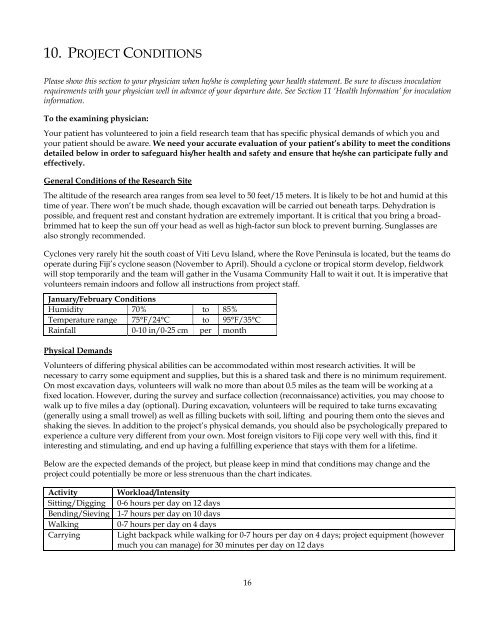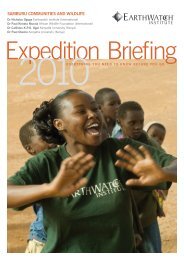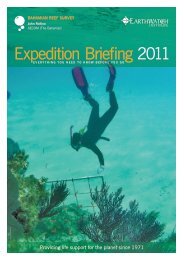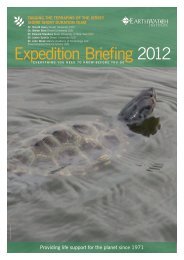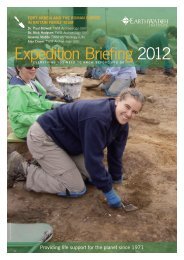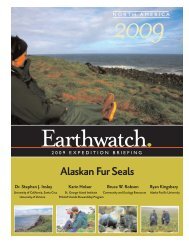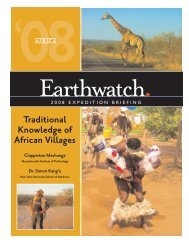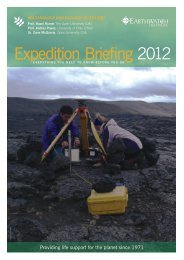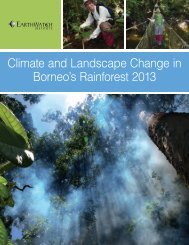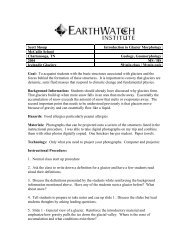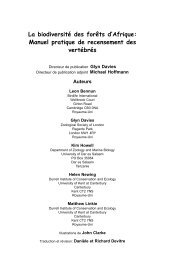Fiji's Ancient Seafarers Dr. Patrick D. Nunn - Earthwatch Institute
Fiji's Ancient Seafarers Dr. Patrick D. Nunn - Earthwatch Institute
Fiji's Ancient Seafarers Dr. Patrick D. Nunn - Earthwatch Institute
You also want an ePaper? Increase the reach of your titles
YUMPU automatically turns print PDFs into web optimized ePapers that Google loves.
10. PROJECT CONDITIONS<br />
Please show this section to your physician when he/she is completing your health statement. Be sure to discuss inoculation<br />
requirements with your physician well in advance of your departure date. See Section 11 ‘Health Information’ for inoculation<br />
information.<br />
To the examining physician:<br />
Your patient has volunteered to join a field research team that has specific physical demands of which you and<br />
your patient should be aware. We need your accurate evaluation of your patient’s ability to meet the conditions<br />
detailed below in order to safeguard his/her health and safety and ensure that he/she can participate fully and<br />
effectively.<br />
General Conditions of the Research Site<br />
The altitude of the research area ranges from sea level to 50 feet/15 meters. It is likely to be hot and humid at this<br />
time of year. There won’t be much shade, though excavation will be carried out beneath tarps. Dehydration is<br />
possible, and frequent rest and constant hydration are extremely important. It is critical that you bring a broadbrimmed<br />
hat to keep the sun off your head as well as high-factor sun block to prevent burning. Sunglasses are<br />
also strongly recommended.<br />
Cyclones very rarely hit the south coast of Viti Levu Island, where the Rove Peninsula is located, but the teams do<br />
operate during Fiji’s cyclone season (November to April). Should a cyclone or tropical storm develop, fieldwork<br />
will stop temporarily and the team will gather in the Vusama Community Hall to wait it out. It is imperative that<br />
volunteers remain indoors and follow all instructions from project staff.<br />
January/February Conditions<br />
Humidity 70% to 85%<br />
Temperature range 75°F/24°C to 95°F/35°C<br />
Rainfall 0-10 in/0-25 cm per month<br />
Physical Demands<br />
Volunteers of differing physical abilities can be accommodated within most research activities. It will be<br />
necessary to carry some equipment and supplies, but this is a shared task and there is no minimum requirement.<br />
On most excavation days, volunteers will walk no more than about 0.5 miles as the team will be working at a<br />
fixed location. However, during the survey and surface collection (reconnaissance) activities, you may choose to<br />
walk up to five miles a day (optional). During excavation, volunteers will be required to take turns excavating<br />
(generally using a small trowel) as well as filling buckets with soil, lifting and pouring them onto the sieves and<br />
shaking the sieves. In addition to the project’s physical demands, you should also be psychologically prepared to<br />
experience a culture very different from your own. Most foreign visitors to Fiji cope very well with this, find it<br />
interesting and stimulating, and end up having a fulfilling experience that stays with them for a lifetime.<br />
Below are the expected demands of the project, but please keep in mind that conditions may change and the<br />
project could potentially be more or less strenuous than the chart indicates.<br />
Activity Workload/Intensity<br />
Sitting/Digging 0-6 hours per day on 12 days<br />
Bending/Sieving 1-7 hours per day on 10 days<br />
Walking 0-7 hours per day on 4 days<br />
Carrying Light backpack while walking for 0-7 hours per day on 4 days; project equipment (however<br />
much you can manage) for 30 minutes per day on 12 days<br />
16


